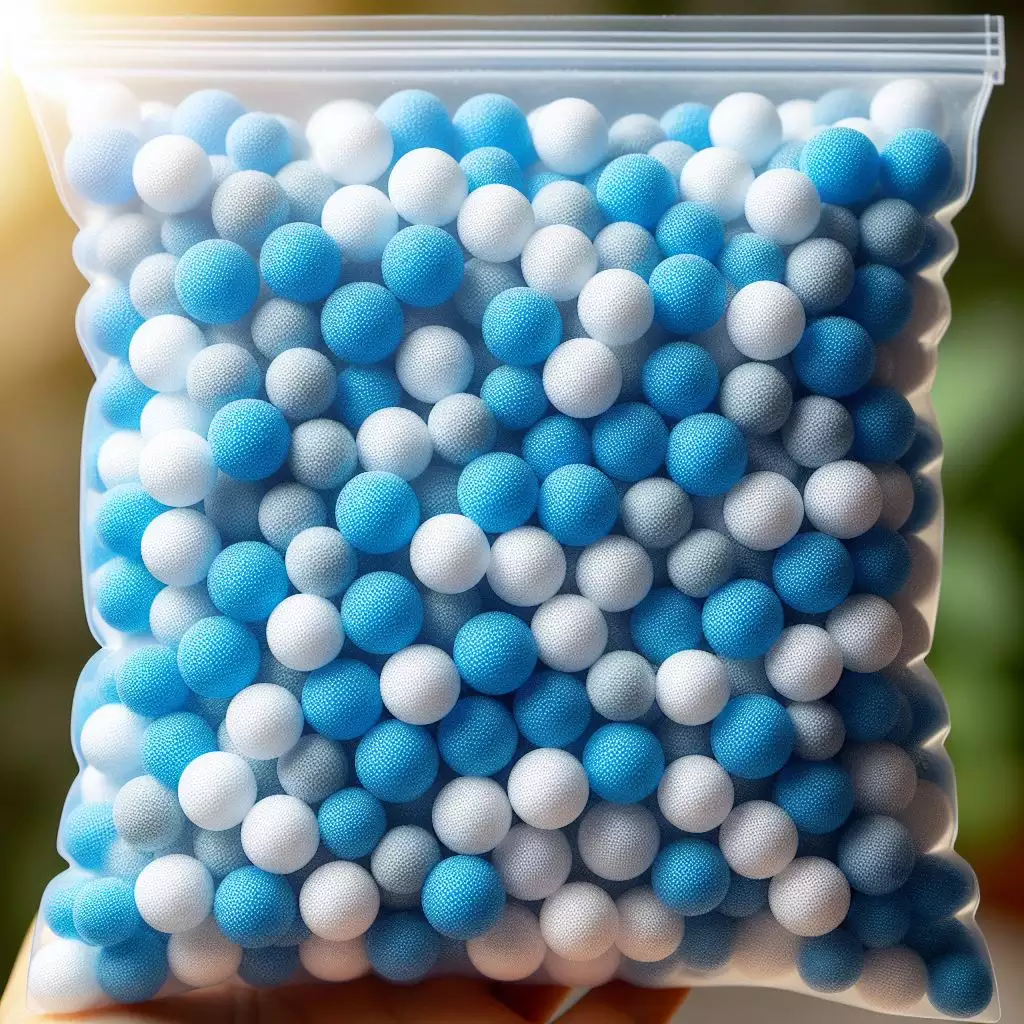Pool maintenance is not just about keeping the water clear but also involves selecting the right filtration medium. Recently, more and more pool owners have started using filter balls instead of sand due to the significant advantages of these new filter balls in terms of performance and convenience. So, how many kilograms of traditional filter sand is one box of reusable pool filter balls equivalent to? This article will delve into this question to help you better understand and use this innovative product.

Understanding Filtration Media: Filter Balls and Filter Sand
Before answering this question, it’s important to understand the basic characteristics of filter sand and filter balls.
Filter Sand
Filter sand is a traditional pool filtration medium, typically using quartz sand. It works by capturing particles and impurities in the water to keep it clean. However, filter sand also has some disadvantages:
- Prone to Clogging: Over time, sand particles can clump together, reducing filtration efficiency.
- Heavy Weight: Replacing and maintaining it is labor-intensive and physically demanding.
- Frequent Backwashing: To maintain filtration efficiency, frequent backwashing is required, wasting a lot of water.
Filter Balls
In contrast, filter balls are a new type of filtration medium made from special polymer materials, offering several advantages:
- High-Efficiency Filtration: Larger surface area and finer fiber structure capture smaller particles.
- Lightweight and Easy to Use: They are light and easy to handle and replace.
- Reduced Backwashing Frequency: Less prone to clogging, reducing the need for backwashing and saving water.
- Durable: Longer lifespan and more resistant to wear and tear.
How Many Kilograms of Filter Sand is Equivalent to One Box of Filter Balls?
To answer this question in detail, we need to compare the filtration effect, weight, and lifespan of the two media.
Filtration Effect Comparison
Using filter balls instead of sand can significantly improve water clarity. This is because the fiber structure of filter balls can capture much smaller particles, whereas filter sand can only capture relatively larger particles. According to various studies and user feedback, one box of filter balls (typically weighing about 700 grams to 1 kilogram) is approximately equivalent in filtration effect to 50 kilograms of filter sand. In other words, if your pool needs 50 kilograms of sand to achieve the desired filtration effect, you only need one box of filter balls.
Weight Comparison
In terms of weight, filter balls have a clear advantage. One box of filter balls typically weighs between 700 grams and 1 kilogram, whereas 50 kilograms of filter sand is much heavier. Using filter balls significantly reduces the physical labor required for transportation and installation. For example, if your pool filtration system requires 100 kilograms of sand, you would only need two boxes of filter balls, each weighing just 700 grams to 1 kilogram. This greatly reduces the physical burden during installation and replacement.
Lifespan Comparison
Filter balls also have a longer lifespan than traditional filter sand. Filter sand usually needs to be replaced every year or every two years, while filter balls, due to their durable materials and structure, can last five years or even longer. Therefore, although the initial cost of filter balls may be higher, they are more cost-effective in the long run.
Detailed Case Analysis
To better understand this comparison, let’s look at a specific case.
Assume you have a pool with a capacity of 30,000 gallons, which traditionally requires 100 kilograms of filter sand to maintain clear water. If you switch to filter balls, one box of filter balls weighing about 700 grams has the filtration effect equivalent to 50 kilograms of filter sand. Therefore, you would need two boxes of filter balls to replace the original 100 kilograms of filter sand.
In actual use, filter balls not only significantly improve water clarity but also reduce the frequency of backwashing and maintenance, saving a considerable amount of water and labor costs.
Economic Benefits of Using Filter Balls
From an economic perspective, using filter balls instead of sand can bring significant long-term savings. Although the price of one box of filter balls may be higher than the equivalent weight of filter sand, considering their longer lifespan and reduced maintenance needs, the overall cost is actually lower.
- Reduced Water Costs: With less frequent backwashing, using filter balls can significantly reduce water bills.
- Lower Maintenance Costs: Fewer maintenance needs mean lower labor costs and less time investment.
- Extended Equipment Lifespan: Since filter balls more effectively prevent clogging and clumping, they can extend the overall lifespan of the filtration system, reducing the frequency of equipment replacement.
Practical Suggestions
If you are considering using filter balls to replace traditional filter sand, here are some practical suggestions:
- Gradual Replacement: If you’re unsure whether filter balls are suitable for your filtration system, start by partially replacing the sand with filter balls, and observe the effect before deciding whether to fully switch.
- Choose Reputable Brands: There are many brands of filter balls on the market; choosing reputable brands ensures product quality and filtration efficiency.
- Regular Inspection and Maintenance: Although filter balls reduce maintenance needs, regular inspection and necessary cleaning are still essential to ensure optimal filtration performance.
Conclusion
In conclusion, one box of reusable pool filter balls significantly outperforms traditional filter sand in terms of filtration effect, weight, and lifespan. Using filter balls instead of sand not only improves water clarity but also reduces maintenance costs and is a more efficient, cost-effective choice.
Through this detailed analysis, we hope you better understand the advantages of filter balls and consider using this innovative filtration medium in your pool filtration system. Keep your pool crystal clear while minimizing maintenance hassles.

 Instant
Quote
Instant
Quote Email
Us
Email
Us